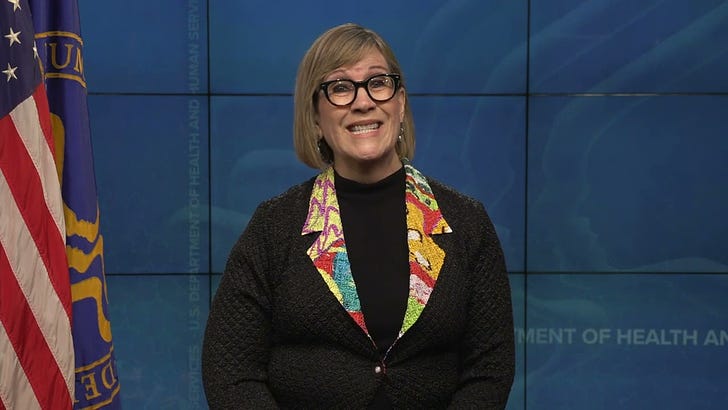IoJ's Comment To The Office Of Research Integrity (ORI) January 4, 2024
Before the Office of Research Integrity changes the laws on research mis-conduct, IoJ finds it important to speak up for the record & dissenting scientists to be included in the definition "relevant"
Thea government really needs to publicize these opportunities for public input better in order to give due process. At the last minute, we pulled together the following comment. Cheerio!
IoJ went out of their way to make the comment to the Office of Research Integrity in regards to their proposed rule making updates. The deadline to comment was January 4, 2024 and we felt it was important so we put in the effort to make the following comment.
Here’s the subject matter:
Action
Notice of proposed rulemaking (NPRM).
Summary
In this Notice of Proposed Rulemaking (NPRM), the Department of Health and Human Services (HHS), Office of the Secretary, Office of the Assistant Secretary for Health (OASH), Office of Research Integrity (ORI) proposes to revise the Public Health Service (PHS) Policies on Research Misconduct. The proposed revisions are based on the experience ORI and institutions have gained with the regulation since it was released in 2005. This NPRM seeks comment from individuals, institutional officials, organizations, institutions, research funding agencies, and other members of the public on the proposed revisions and how to improve the clarity of substantive and non-substantive.
To read the proposed updates, click here.
READ IoJ’s COMMENT BELOW:
If you think IoJ is doing a good job, feel free buy us a coffee so we can keep writing the Governments to keep them in check. If you want to support us in this mission we THANK YOU! We are 100% non profit and need help.
Here’s what IoJ had to say:
Comment To Public Health Service Policies on Research Misconduct
To: (ORI) Office of Research Integrity/(HHS) Health and Human Services
Regulatory Information Number: (RIN) 0937–AA12 Comment
January 4, 2024
Dear Friends,
1. Implementation Timeline ORI proposes to release the final rule in summer of 2024, with implementation to begin a minimum of 4 months afterwards, and an effective date of January 1, 2025. This implementation timeframe is not sufficient for institutions to conduct a substantial policy revision process, which requires input and approval from many constituents across the institution and should include a public hearing with a wider range of views. We specifically request more time for due process and the ability to have a public consultation or hearing to hash out details in a debate like setting with a wide variety of legal, ethical and scientific integrity experts. We just learned of this and are up late trying to help ORI but we need more time for due process and so does the greater scientific community who should also be alerted and have the chance to provide input. Our Global Science Integrity Task Force www.gsitf.org is formally requesting a hearing with worlds top scientists and opportunity to be involved in this process past Jan 4, 2024. Please and thank you.
2. “Accepted Practices of the Relevant Research Community” (§ 93.200) Research misconduct determinations require a finding of a significant departure from the “accepted practices of the relevant research community.” These practices vary depending on the discipline. The practices used to document and analyze genomic research are different from those used in basic biochemistry, clinical trials or social and behavioral research, all of which may be funded by PHS. If ORI changes the law to narrowly define “Accepted Practices of the Relevant Research Community” in a way tied to PHS funding, or any type of funding it undermines the very spirit of independent and dissenting science as absolutely required. see: https://www.whitehouse.gov/ostp/news-updates/2022/01/11/white-house-office-of-science-technology-policy-releases-scientific-integrity-task-force-report/ JANUARY 11, 2022 White House Office of Science & Technology Policy Releases Scientific Integrity Task Force Report
In 2009, the Obama Administration identified six principles of scientific integrity. To not only restore, but to strengthen the integrity of Federal science beyond the efforts of any previous Administration, the Task Force makes five additional recommendations to guide policymaking and foster a culture of scientific integrity in Federal agencies:
All Federal agencies—not just those that fund and conduct scientific research—should develop, implement, and periodically update scientific integrity policies. Protecting scientific integrity is essential for any Federal agency or entity that communicates or makes use of scientific and technical information in decision-making.
Scientific integrity policies should apply to all those in Federal agencies who manage, communicate, or use science, not just to scientists and engineers who conduct research, and not just to career employees, but contractors and political appointees as well. All must be trained in scientific integrity and their roles in upholding it.
Scientific integrity policies should be modernized to address important, emergent issues of our time. They must advance diversity, equity, inclusion, and accessibility; address new concerns arising from the use of emerging technologies such as artificial intelligence and machine learning; and apply to emerging modes of science, such as citizen science and community-engaged research with Federal involvement.
There should be broader dissemination and adoption of good scientific integrity practices across the Federal Government, a task that could be facilitated by more formalized interagency collaboration.
There should be widespread training for agency scientists so they can communicate scientific findings effectively to nonscientists in their agencies and to lay audiences, with the idea of helping ensure that policies and actions are based on an accurate understanding of the science.
In the coming months, OSTP will draw upon the findings of the Task Force to develop a plan for the regular assessment and iterative improvement of scientific-integrity policies and practices. In addition, agency leadership, working closely with OSTP, will deploy this framework to ensure that their scientific-integrity policies are informed by the Task Force report and adhere to scientific-integrity principles.
ORI must draft any changes in a way which includes protections for dissenter scientists and their scientific integrity dispute claims and confidentiality for whistleblowers who are up against serious imbalance of power.
Any change to “Accepted Practices of the Relevant Research Community” (§ 93.200), if needed at all, which is debatable, must consider the relevance of dissenter scientists who are marginalized and who expose corruption, therefore cannot apply for and receive PHS grants which are withheld due to imbalance of power and corrupt practices which exclude dissent. ORI's proposed changes need to ensure the definition specifically includes the "legitimate concerns and dissent of the greater scientific community" as being part of “Accepted Practices of the Relevant Research Community”.
There are some proposed rules which may further create an imbalance of power, and this is a chilling situation which requires a hearing to further hear from the relevant dissenter scientific community of whistleblowers who are the type that file research misconduct charges, and whom these proposed changes may actually affect in a way which may limit or expose their capability to act as protected whistleblowers.
We are running out of time to submit this, and have had to skip important issues. For that reason, we kindly request ORI extend their completion date of 2024 by at least a year, and extend an invitation to a hearing or consultation on the ORI proposed changes in order to best help ORI in the mission of strengthening the regulations for research misconduct.
Thank you to your attention to strengthen regulations of research misconduct of scientific integrity and appreciate all of you working with us so we are able to provide a written comment and have participation in order to protect the public health and safety.
Thank you and looking forward,
Cordially,
Interest Of Justice,
Dustin Bryce,
If you think IoJ is doing a good job, feel free buy us a coffee so we can keep writing the Governments to keep them in check. If you want to support us in this mission we THANK YOU! We are 100% non profit and need help.








This approach is GENIUS!
This is an outstanding statement by IoJ. Thank you.